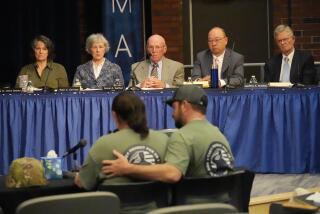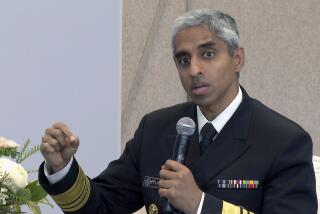Sandy Hook violence prevention commission meets for first time
- Share via
A 16-member commission, appointed in Connecticut to examine last month’s shooting rampage at an elementary school, kicked off its deliberations Thursday, even as the nation continued to wrestle with finding policies on how to deal with gun violence.
The Sandy Hook Advisory Commission was appointed to review a variety of gun issues including school safety and mental health questions. It is expected to issue preliminary recommendations by mid-March.
The advisory commission was created by Gov. Dannel P. Malloy on Jan. 3, just weeks after the attack by Adam Lanza on the Sandy Hook Elementary School in Newtown, Conn. Using an assault weapon, Lanza killed 20 children and six adults in the school. He began his spree by killing his mother in the home they shared and ended it by killing himself.
The lead prosecutor in the case, Danbury State’s Atty. Stephen Sedensky III, told the panel that the State Police investigating the attack may not issue its report on the crime’s details until June. He said he would work with the panel, but noted that there are confidentiality issues involving Lanza’s mental state at the time.
With the massacre still fresh in people’s minds, many policy-makers have already begun focusing on two areas: mental health issues and access to weapons and ammunition.
There is a constitutional right to bear arms, Malloy told the commission on Thursday but “that right cannot come at the expense of public safety.”
Malloy has made clear his commission’s mandate.
“Shortly after the initial horror and the immediate grief over what occurred at Sandy Hook Elementary School on Dec. 14, there was one question on the lips of many of our residents: How do we make sure this never happens again,” the governor has said.
“This commission will look for ways to make sure our gun laws are as tight as they are reasonable, that our mental health system can reach those that need its help and that our law enforcement has the tools it needs to protect public safety, particularly in our schools,” he said, setting out the panel’s agenda.
The first meeting came after President Obama announced his package of gun-control measures, including a renewed ban on assault weapons and on high-capacity ammunition magazines; he also called for more money for mental health diagnoses and treatment and school safety preparedness.
On Thursday, a proposed law to renew the ban on assault weapons was formally introduced in Congress, where it is expected to face conservative opposition.
The Connecticut group began its work by calling experts who had been involved in the sad litany of previous school massacres in Columbine, Colo. and at Virginia Tech.
The 1999 shooting at Columbine High School remains the deadliest high school shooting in the nation’s history. Two seniors, Eric Harris and Dylan Klebold, murdered 12 students and one teacher. They injured 21 additional students, with three other people being injured while attempting to escape the school. The pair then committed suicide.
Former Colorado Gov. Bill Ritter, a member of the panel that reviewed the Columbine rampage, urged the Connecticut group to focus on the intersection of mental health and gun violence. He said “incident after incident” since Columbine has shown there’s a relationship between the two issues.
“What we don’t want is a policy debate in this country, I think, or in Connecticut, that gets locked down around the polar opposites around gun control or the polar opposites around mental health or mental health funding,” said Ritter, according to media reports from the commission meeting. “Part of this has to be this broad discussion and a discussion about the intersection.”
Law professor Richard Bonnie, from the University of Virginia, urged the panel to move slowly and noted that it could take years for the group to finish its task. He warned that acting prematurely could lead to “disproportionate responses,” such as eroding privacy rights for the mentally ill. Bonnie was a consultant to the group that reviewed the Virginia Tech massacre.
On April 16, 2007, a senior went on a rampage on the campus of Virginia Tech in Blacksburg, Va. Seung-hui Cho killed 32 people and wounded 17 others in two separate attacks, approximately two hours apart, before committing suicide. Six others were injured escaping from classroom windows.
The attack is considered the deadliest shooting incident by a single gunman in U.S. history.
ALSO:
Who will you sue if your spacecraft crashes?
Albuquerque mourns Greg Griego, family after massacre
Mentally disturbed felon had gun permit, and built an arsenal
More to Read
Sign up for Essential California
The most important California stories and recommendations in your inbox every morning.
You may occasionally receive promotional content from the Los Angeles Times.











